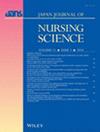Development of family readiness instrument for caring of stroke patients at home: Application of transition theory
Abstract
Background
Lack of family readiness to care for stroke patients can negatively impact the health of family members who serve as primary caregivers, often leading to prolonged stress and depression.
Aim
This study aimed to develop a valid and reliable family readiness instrument based on a transition model to assess preparedness for caring for stroke patients at home.
Methods
A mixed-methods approach was employed in this research, consisting of four phases: Delphi Study, face validity, content validity, and testing for structural validity and reliability. A total of 153 participants were included in this study. In the first phase, a Delphi Study was conducted in three rounds to reach consensus on the instrument items, involving eight experts. The second phase involved 30 family members of stroke patients to test face validity. In the third phase, content validity was assessed by five experts using the “judgment by expert” method. The final phase involved testing structural validity and reliability with 110 families of caregivers of patients with stroke.
Results
The results of the exploratory factor analysis (EFA) identified three main factors: awareness (12 items), involvement (6 items), and changes in internal and external processes (2 items). The instrument demonstrated good reliability with a Cronbach's alpha value of .811.
Conclusion
Twenty items from the family readiness instrument based on the transition model were valid and reliable for the Indonesian family population, making it suitable for assessing family readiness in caring for stroke patients at home.

 求助内容:
求助内容: 应助结果提醒方式:
应助结果提醒方式:


